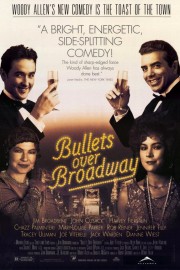Bullets Over Broadway
There really are not many Woody Allen films I may watch in the future, and there are fewer still that I may revisit. I’ve never had the affection for the writer-director that I know others have, and even though the controversies in his personal life are among the most complicated in what could be true vs. what the perception is, they’re enough to where I’m not really going to go out of my way to see another Allen film. But his 1994 comedy, “Bullets Over Broadway,” is one I knew I wanted to revisit; it’s always been fondly remembered by me, and was my first Allen film I watched. It’s also the first one I have added to my collection; I had to purchase a used copy for this rewatch, as it’s not readily available any other way. I will say that it is a shame this is not more available, because this holds up as one of the filmmaker’s finest movies.
While Woody Allen can be a very good screen presence, he can also be grating to watch, so it’s not really a surprise that, of the films of his I’ve seen, my favorites are the ones in which he does not star. Yes, “Manhattan” and “Annie Hall” are classics, but it’s when we get to see other actors work within the storytelling structure and sharp dialogue Allen provides without having to play off of Allen himself where the gifts he has as a filmmaker shine. In “Bullets Over Broadway,” Allen has made himself a surrogate in playwright David Shayne, an aspiring Broadway writer whom is trying to get his first production of the ground, but finds life in 1928 New York adding some hurdles he never saw coming. In this film, John Cusack plays Shayne, and thus, plays Allen. When another actors plays, what is essential, a role Allen wrote inspired by himself, the film’s success or failure flies on how well the actor inhabits that role, and Shayne fits Cusack like a glove. Unlike someone like Kenneth Branagh in “Celebrity” or Larry David in “Whatever Works,” Cusack works in this role not because of how closely he hues to Allen’s natural persona, but by how much he brings of his own to the role, and this performance fits nicely within what we think of as a John Cusack performance. Yes, you can tell that Woody Allen wrote this character inspired by himself, but it’s the way Cusack plays the role with his natural charm and charisma that makes us feel for him as his production has to overcome obstacles such as mob financing that leads to a gangland moll (the wonderful Jennifer Tilly) getting a significant role; a hitman (Chazz Palminteri, fantastic) watching over her; a trio of actors (played by Dianne Wiest, Jim Broadbent, and Tracey Ullman); and his girlfriend (Mary Louise Parker) and a friend (Rob Reiner) looking on as this unfolds.
The screenplay by Woody Allen and Douglas McGrath has some modern touches in terms of language, to be sure, but could have easily been a film from the ’30s or ’40s in how farcical it plays, at times. This is sharp and very funny work by the pair as they put Shayne through one challenge on top of another, with plenty of surprises, along the way. It also gets to the pain and compromise of bringing art to life, especially when so many other moving parts are involved. This is best seen in the storylines with Olive, Tilly’s character, and Cheech, Palminteri’s character. Olive is a dancer at lounges who wants to be a respected actress, but has no talent for it. She is forced on to Shayne when Olive’s mob boyfriend, Nick Valenti (Joe Viterelli), bankrolls the production, and while they manage to get away with giving her a smallish role, it’s obvious that she lacks the talent to make this material work. Not helping this stressful situation is Cheech, who is watching rehearsals like a hawk, chiming in to make sure Olive gets as much notice as possible. A distraction at first, one day he starts to make some suggestions that actually find Shayne receptive, leading to an unlikely collaboration that leads to some unexpected choices before the show premieres. Tilly and Palminteri were both deservingly Oscar-nominated for this film, along with Wiest’s Helen Sinclair (who won Best Supporting Actress), an aging actress whom is the lead in this, and butters up Shayne as a way of encouragement, but you cannot help but wonder if it’s for another purpose, as well. Wiest is brilliant in the role, which recalls Norma Desmond in “Sunset Blvd” in how much of a diva she behaves like, while also showing affection for a younger man. This is just a delightful film to watch from start to finish, and it’s the cast that does it.










